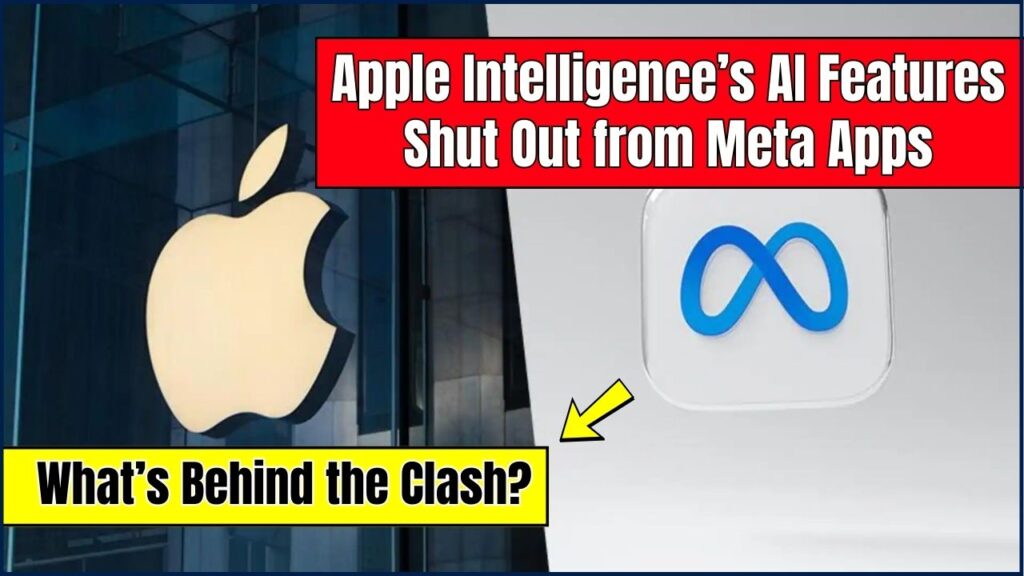AI Features Shut Out from Meta Apps: Apple Intelligence is Apple’s headline-grabbing suite of artificial intelligence features rolled out for iPhones, iPads, and Macs. With machine learning built into everyday tools like Siri, Mail, and Photos, it promises a new age of personalization and productivity. But while Apple is opening up its walled garden—carefully, of course—to some external AI partners, one major tech giant didn’t make the cut: Meta.

That’s right. Meta apps like Instagram, WhatsApp, and Facebook won’t have access to Apple Intelligence features. Not now, and maybe not anytime soon. This isn’t a technical glitch—it’s a calculated decision. Behind this move is a clash of philosophies, histories, and business strategies between two of the most powerful players in Big Tech.
So, what’s the beef between Apple and Meta, and why does it matter to regular folks like us? Let’s unpack it.
AI Features Shut Out from Meta Apps
| Detail | Info |
|---|---|
| Topic | Apple blocks Meta apps from using Apple Intelligence AI features |
| Primary Reason | Privacy concerns and lack of data transparency |
| Meta AI Affected | Llama AI integration, Meta AI chatbot support |
| Apple AI Partner | OpenAI’s ChatGPT, with strict privacy guardrails |
| Possible Workaround | Meta users may still use browser-based tools |
| Regulatory Layer | Digital Markets Act (DMA) causing friction in the EU |
| Official Source | Bloomberg Report |
Apple’s move to exclude Meta from its AI circle is more than a feud—it’s a line in the sand about privacy, control, and the future of tech. Apple is doubling down on its image as a privacy champion, while Meta continues pushing the boundaries of personalized AI services.
For users, this means trade-offs. You get super-slick AI integration inside Apple’s walled garden, but lose access to those tools in Meta apps. Or, you use Meta apps with AI, but without Apple’s privacy protections.
As AI becomes the core of your digital experience, these choices will matter more than ever. One thing’s for sure: this battle between Apple and Meta is far from over—and how it plays out will shape the future of mobile AI.
Why Apple Is Blocking Meta from Its AI Ecosystem
Let’s be honest: Apple wears privacy like a badge of honor. Its entire brand image revolves around keeping your data safe and out of reach from third-party advertisers. That’s a huge reason many users trust Apple over other tech platforms.
Meta, on the other hand, has spent the last decade digging itself out of one privacy scandal after another. From the Cambridge Analytica debacle to constant allegations of data misuse, targeted advertising manipulation, and surveillance capitalism—it’s no surprise that Apple wants to keep its distance.
When Meta approached Apple in early 2024 to explore an integration of Llama, its proprietary AI chatbot, Apple reportedly shut the conversation down almost immediately. According to insiders cited by Bloomberg, Apple concluded that Meta’s data practices posed too high a risk. That includes concerns that Meta could mine user data from devices, compromising Apple’s ecosystem of trust.
In short, Apple saw too much potential for user data exposure and too little control over how Meta would use that data. Apple’s stance? If you want to live in our AI neighborhood, you have to follow our house rules—and Meta wasn’t playing ball.
Who Did Apple Choose Instead?
While Meta was shown the door, OpenAI walked right in. Apple announced a partnership to bring ChatGPT into Siri and other Apple Intelligence features, letting users tap into large language models without giving up control of their data.
Here’s what makes the OpenAI partnership tick:
- Explicit user consent: ChatGPT won’t run unless you say so.
- No training on Apple queries: Anything you ask through Siri is off-limits for training OpenAI models.
- Temporary data: Queries aren’t logged or stored permanently.
This model of consent, transparency, and containment fits Apple’s privacy-first ideology. And it’s not stopping at OpenAI. Reports say Apple is also in ongoing discussions with Google (Gemini) and Anthropic (Claude) to widen its AI toolkit. These partnerships would bring AI diversity to Apple devices without diluting its privacy brand.
What This Means for iPhone Users Who Love Meta Apps
Here’s the straight-up impact for the average user: if you love Instagram or WhatsApp, you won’t be seeing Apple Intelligence inside those apps anytime soon. No smart replies in your Instagram DMs. No automatic photo captions in Facebook posts. No AI-summarized chats in WhatsApp.
Apple’s AI is deeply baked into the system—think of it like a brain that helps you across all native apps. But Meta’s apps live in their own little world. Without a handshake between the companies, they don’t get to tap into that brain.
This means:
- No auto-summarization of long WhatsApp group chats.
- No context-aware suggestions in Messenger conversations.
- No privacy-safe Siri help within Meta platforms.
It’s like buying a smart home but not letting one of your most-used appliances talk to your smart assistant.
The EU Has Entered the Chat: Digital Markets Act (DMA)
In the U.S., Apple mostly does what it wants. But in Europe, the story changes.
The Digital Markets Act (DMA) is a sweeping piece of legislation aimed at breaking up tech monopolies and enforcing platform interoperability. Under the DMA, companies like Apple must allow fair access to core platform services.
That’s where things get tricky. Meta has reportedly filed multiple requests to access Siri and Apple Intelligence tools under the DMA provisions. But Apple, citing user security and data risks, has denied them every time.
Regulators might soon force Apple to provide access or face hefty fines. The tension between regulation and corporate privacy commitments is playing out in real time, and the result could reshape how AI integrations work on iPhones across Europe.
Can Meta Still Get On iPhones with AI?
Technically, yes. But not in the way you’d expect.
Meta users might still access its AI services through browser-based experiences, meaning you could fire up Safari and interact with Meta AI via a webpage. It’s clunky, but it works. Meta could also create standalone AI apps that don’t rely on Apple Intelligence, though these would still be subject to Apple’s App Store policies.
Another route? Meta could expand hardware offerings like the Quest headset, where it controls the environment and Apple can’t say no. That’s a longer-term play, but Meta’s shown it’s serious about building its own AI-enhanced hardware ecosystem.
None of these options provide the seamlessness of Apple’s native integrations. They’re workarounds, not solutions.
What This Means for the Future of AI on Your Devices
This situation is just a taste of what’s to come. As more devices get smarter, the question won’t just be “What can my phone do?” but also “Whose AI is running on it?”
- Apple is going all-in on controlled, consent-based AI.
- Meta wants wide-scale, ad-supported AI integrations.
- Governments want competition and transparency.
The tech world is heading toward AI ecosystems that act like rival operating systems. That means consumers might need to make more thoughtful decisions not just about what brand of phone they buy—but what philosophy they’re signing up for.
Apple’s approach may seem closed-off, but it’s trying to offer reliable and trustworthy AI. Meta’s strategy aims for ubiquity, but the trade-off may be less control over your data.
Expect future smartphones to come with AI feature labels, data usage disclosures, and more aggressive pushback from regulators. The lines between tech choice and personal values are blurring.
UAE Partners With Italian Startup To Build AI Supercomputer Powerhouse
Elon Musk’s xAI Just Updated Grok After Controversial Comments Spark Outrage
Google Just Blew Everyone Away at Android Show 2025 – Here’s Every Big Announcement
Frequently Asked Questions On AI Features Shut Out from Meta Apps
Q1: Why did Apple reject Meta’s AI integration?
Apple cited serious privacy concerns, including Meta’s historical misuse of user data and its lack of transparency regarding how user queries would be processed and stored.
Q2: Will I still be able to use Meta AI on my iPhone?
Yes, but not natively. You can use Meta AI via web browsers or third-party apps, but not within Apple Intelligence or Siri environments.
Q3: Is Apple allowing any other AI partners?
Yes. Apple is currently working with OpenAI, and is in talks with Google and Anthropic to broaden AI offerings across Apple devices.
Q4: Is this a permanent ban on Meta apps using Apple Intelligence?
Not officially, but unless Meta significantly changes its data policies, Apple is unlikely to reconsider integration.
Q5: How does this affect users?
Users who rely heavily on Meta apps will miss out on AI features like automatic suggestions, summaries, and enhanced search inside those apps on Apple devices.











